PSY388: Exploring the Role of Social Networking in Mental Health
VerifiedAdded on 2022/08/20
|19
|3547
|12
Literature Review
AI Summary
This literature review explores the relationship between social networking and mental health, particularly focusing on the prevalence of stress among Facebook users. It examines existing literature from 2010 to 2020, analyzing peer-reviewed articles from databases like PROQUEST, SAGE, SPRINGER, and ELSEVIER. The review uses keywords such as 'social networking', 'mental health', and 'stress' to identify relevant studies, applying psychological methods and focusing on primary data. The results, derived from an initial search of 510 articles narrowed down to 6 relevant ones, highlight the negative consequences of heavy social networking, including feelings of missing out, increased stress, and the impact of cyberbullying. The review emphasizes the importance of understanding the addictive aspects of social media and the role of social comparison in mental well-being, providing valuable insights for future research and a deeper comprehension of social networking's effects.
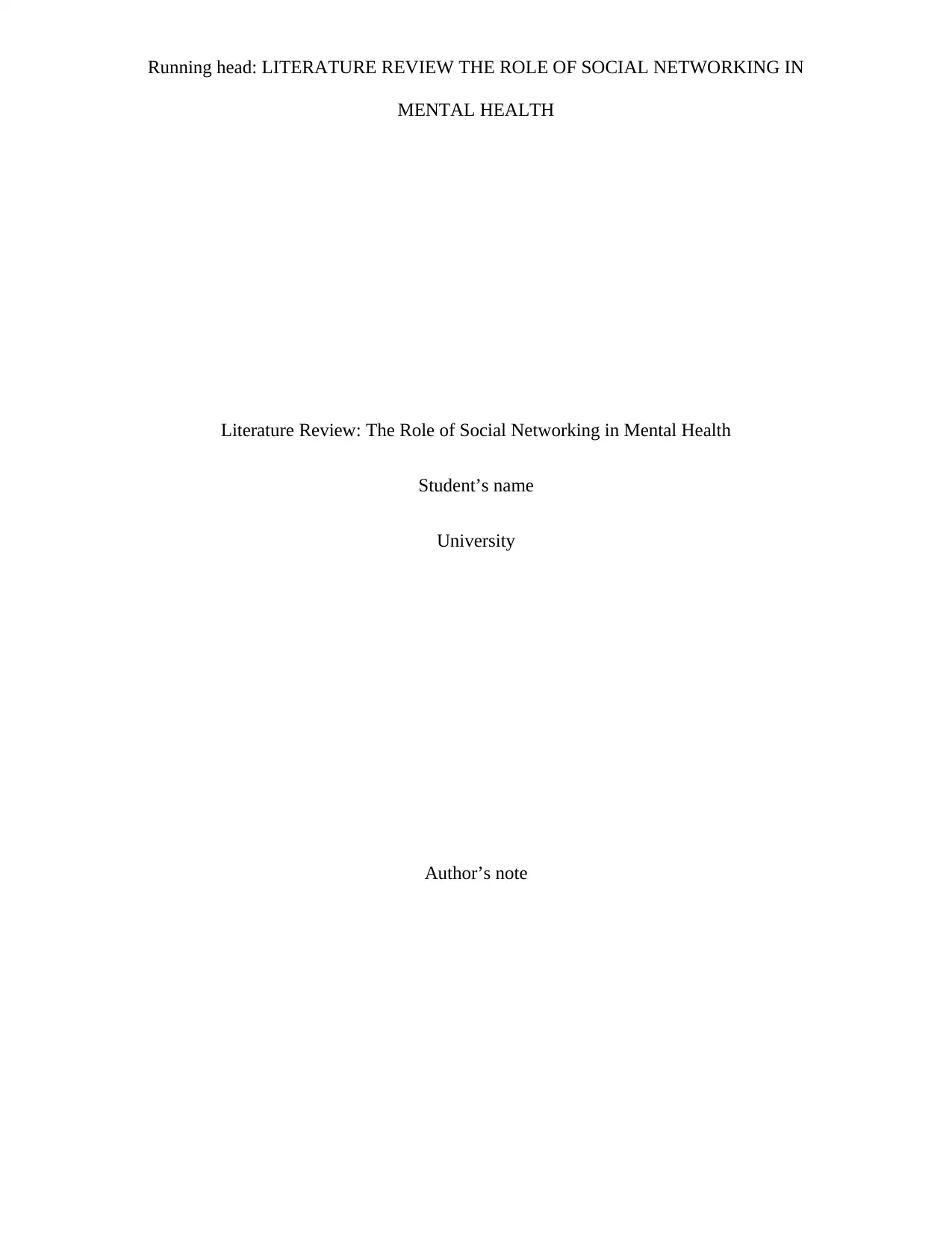
Running head: LITERATURE REVIEW THE ROLE OF SOCIAL NETWORKING IN
MENTAL HEALTH
Literature Review: The Role of Social Networking in Mental Health
Student’s name
University
Author’s note
MENTAL HEALTH
Literature Review: The Role of Social Networking in Mental Health
Student’s name
University
Author’s note
Paraphrase This Document
Need a fresh take? Get an instant paraphrase of this document with our AI Paraphraser
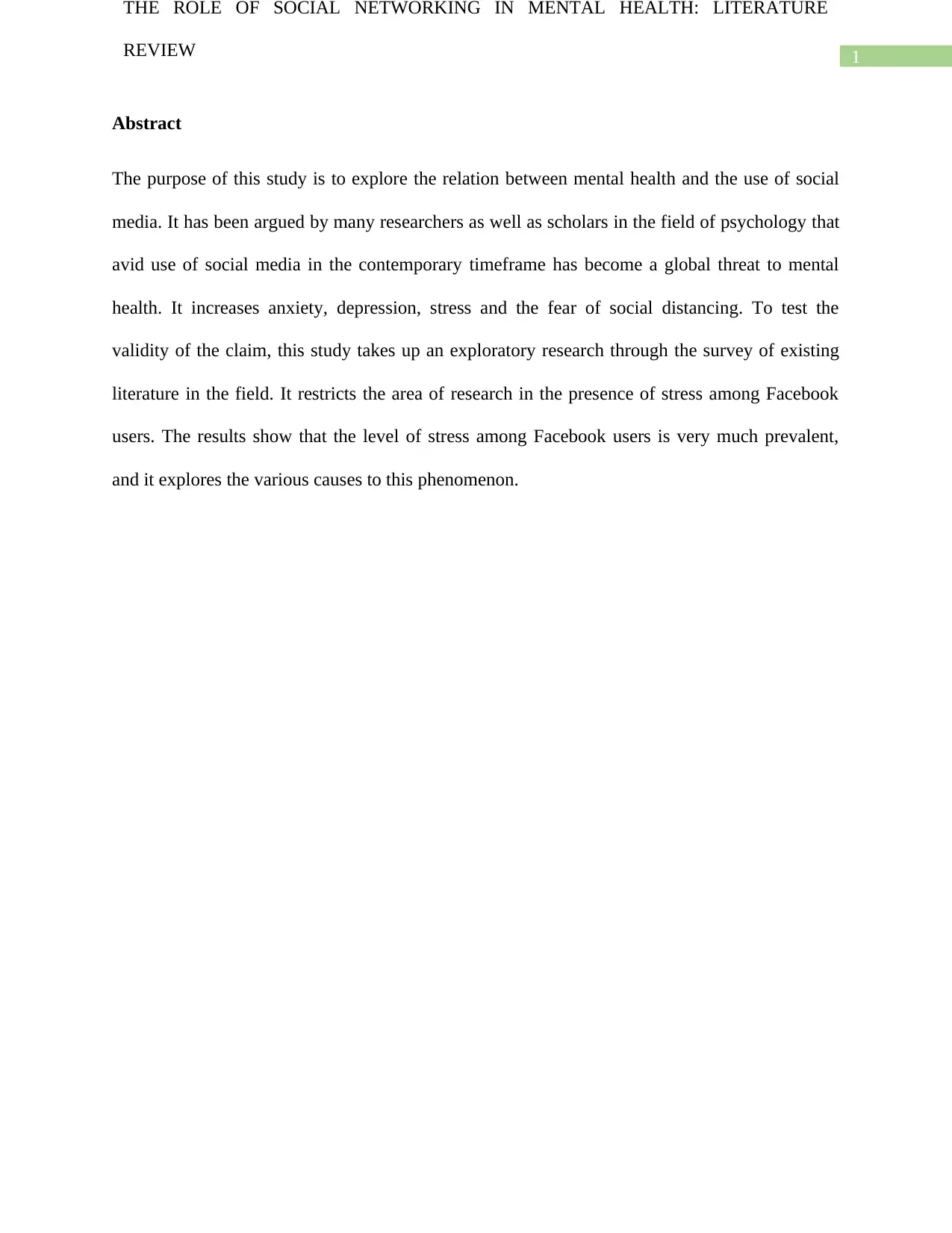
1
THE ROLE OF SOCIAL NETWORKING IN MENTAL HEALTH: LITERATURE
REVIEW
Abstract
The purpose of this study is to explore the relation between mental health and the use of social
media. It has been argued by many researchers as well as scholars in the field of psychology that
avid use of social media in the contemporary timeframe has become a global threat to mental
health. It increases anxiety, depression, stress and the fear of social distancing. To test the
validity of the claim, this study takes up an exploratory research through the survey of existing
literature in the field. It restricts the area of research in the presence of stress among Facebook
users. The results show that the level of stress among Facebook users is very much prevalent,
and it explores the various causes to this phenomenon.
THE ROLE OF SOCIAL NETWORKING IN MENTAL HEALTH: LITERATURE
REVIEW
Abstract
The purpose of this study is to explore the relation between mental health and the use of social
media. It has been argued by many researchers as well as scholars in the field of psychology that
avid use of social media in the contemporary timeframe has become a global threat to mental
health. It increases anxiety, depression, stress and the fear of social distancing. To test the
validity of the claim, this study takes up an exploratory research through the survey of existing
literature in the field. It restricts the area of research in the presence of stress among Facebook
users. The results show that the level of stress among Facebook users is very much prevalent,
and it explores the various causes to this phenomenon.
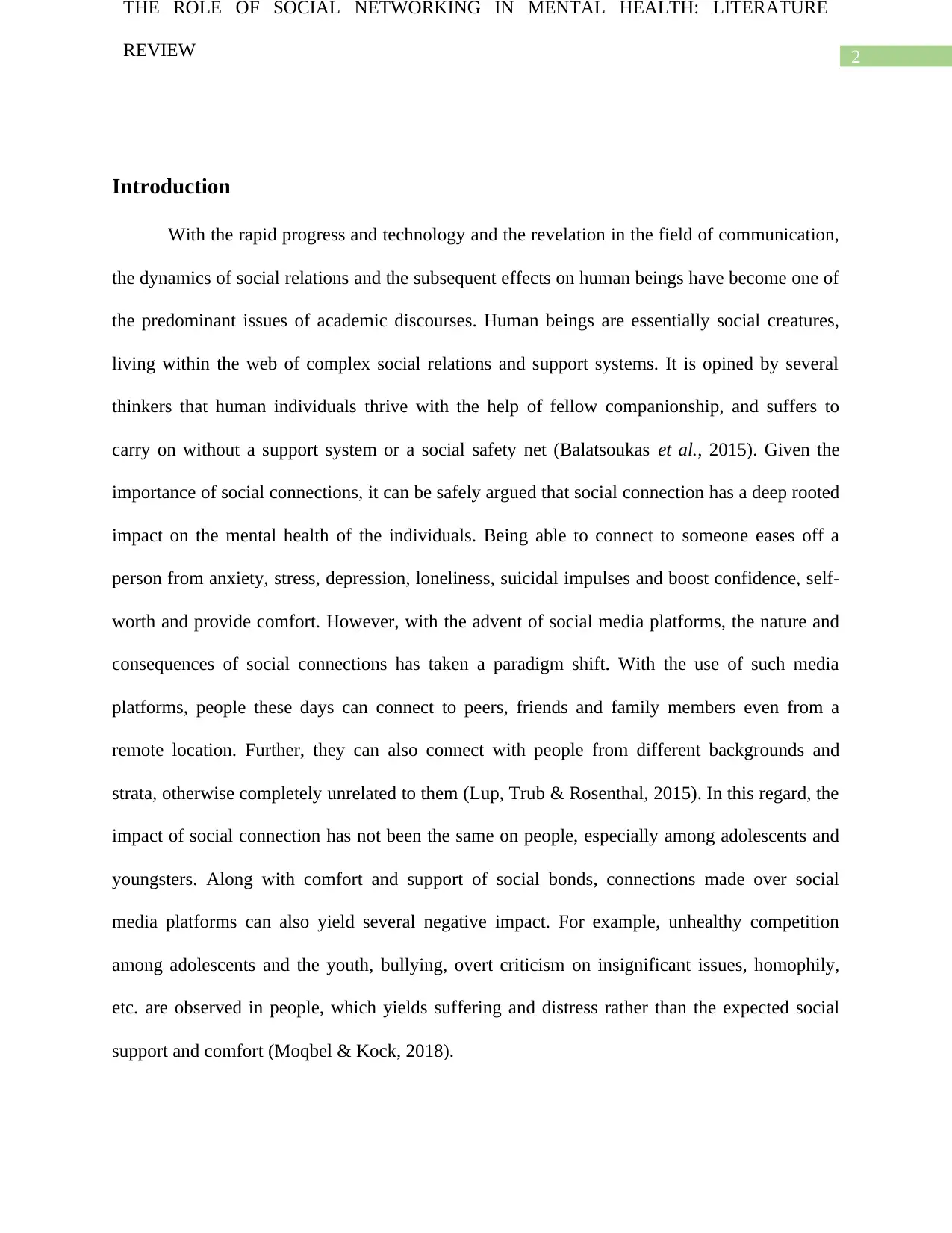
2
THE ROLE OF SOCIAL NETWORKING IN MENTAL HEALTH: LITERATURE
REVIEW
Introduction
With the rapid progress and technology and the revelation in the field of communication,
the dynamics of social relations and the subsequent effects on human beings have become one of
the predominant issues of academic discourses. Human beings are essentially social creatures,
living within the web of complex social relations and support systems. It is opined by several
thinkers that human individuals thrive with the help of fellow companionship, and suffers to
carry on without a support system or a social safety net (Balatsoukas et al., 2015). Given the
importance of social connections, it can be safely argued that social connection has a deep rooted
impact on the mental health of the individuals. Being able to connect to someone eases off a
person from anxiety, stress, depression, loneliness, suicidal impulses and boost confidence, self-
worth and provide comfort. However, with the advent of social media platforms, the nature and
consequences of social connections has taken a paradigm shift. With the use of such media
platforms, people these days can connect to peers, friends and family members even from a
remote location. Further, they can also connect with people from different backgrounds and
strata, otherwise completely unrelated to them (Lup, Trub & Rosenthal, 2015). In this regard, the
impact of social connection has not been the same on people, especially among adolescents and
youngsters. Along with comfort and support of social bonds, connections made over social
media platforms can also yield several negative impact. For example, unhealthy competition
among adolescents and the youth, bullying, overt criticism on insignificant issues, homophily,
etc. are observed in people, which yields suffering and distress rather than the expected social
support and comfort (Moqbel & Kock, 2018).
THE ROLE OF SOCIAL NETWORKING IN MENTAL HEALTH: LITERATURE
REVIEW
Introduction
With the rapid progress and technology and the revelation in the field of communication,
the dynamics of social relations and the subsequent effects on human beings have become one of
the predominant issues of academic discourses. Human beings are essentially social creatures,
living within the web of complex social relations and support systems. It is opined by several
thinkers that human individuals thrive with the help of fellow companionship, and suffers to
carry on without a support system or a social safety net (Balatsoukas et al., 2015). Given the
importance of social connections, it can be safely argued that social connection has a deep rooted
impact on the mental health of the individuals. Being able to connect to someone eases off a
person from anxiety, stress, depression, loneliness, suicidal impulses and boost confidence, self-
worth and provide comfort. However, with the advent of social media platforms, the nature and
consequences of social connections has taken a paradigm shift. With the use of such media
platforms, people these days can connect to peers, friends and family members even from a
remote location. Further, they can also connect with people from different backgrounds and
strata, otherwise completely unrelated to them (Lup, Trub & Rosenthal, 2015). In this regard, the
impact of social connection has not been the same on people, especially among adolescents and
youngsters. Along with comfort and support of social bonds, connections made over social
media platforms can also yield several negative impact. For example, unhealthy competition
among adolescents and the youth, bullying, overt criticism on insignificant issues, homophily,
etc. are observed in people, which yields suffering and distress rather than the expected social
support and comfort (Moqbel & Kock, 2018).
⊘ This is a preview!⊘
Do you want full access?
Subscribe today to unlock all pages.

Trusted by 1+ million students worldwide
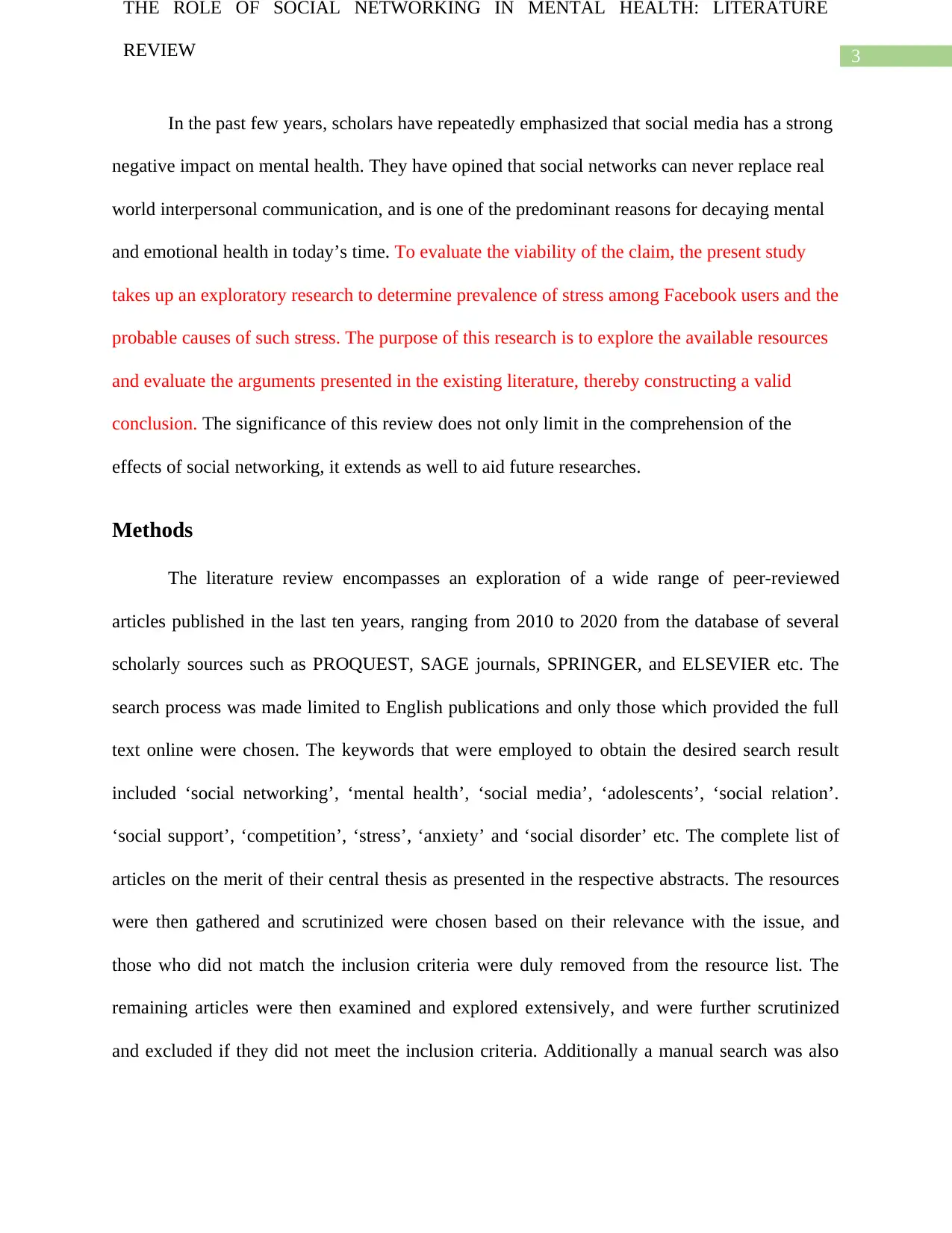
3
THE ROLE OF SOCIAL NETWORKING IN MENTAL HEALTH: LITERATURE
REVIEW
In the past few years, scholars have repeatedly emphasized that social media has a strong
negative impact on mental health. They have opined that social networks can never replace real
world interpersonal communication, and is one of the predominant reasons for decaying mental
and emotional health in today’s time. To evaluate the viability of the claim, the present study
takes up an exploratory research to determine prevalence of stress among Facebook users and the
probable causes of such stress. The purpose of this research is to explore the available resources
and evaluate the arguments presented in the existing literature, thereby constructing a valid
conclusion. The significance of this review does not only limit in the comprehension of the
effects of social networking, it extends as well to aid future researches.
Methods
The literature review encompasses an exploration of a wide range of peer-reviewed
articles published in the last ten years, ranging from 2010 to 2020 from the database of several
scholarly sources such as PROQUEST, SAGE journals, SPRINGER, and ELSEVIER etc. The
search process was made limited to English publications and only those which provided the full
text online were chosen. The keywords that were employed to obtain the desired search result
included ‘social networking’, ‘mental health’, ‘social media’, ‘adolescents’, ‘social relation’.
‘social support’, ‘competition’, ‘stress’, ‘anxiety’ and ‘social disorder’ etc. The complete list of
articles on the merit of their central thesis as presented in the respective abstracts. The resources
were then gathered and scrutinized were chosen based on their relevance with the issue, and
those who did not match the inclusion criteria were duly removed from the resource list. The
remaining articles were then examined and explored extensively, and were further scrutinized
and excluded if they did not meet the inclusion criteria. Additionally a manual search was also
THE ROLE OF SOCIAL NETWORKING IN MENTAL HEALTH: LITERATURE
REVIEW
In the past few years, scholars have repeatedly emphasized that social media has a strong
negative impact on mental health. They have opined that social networks can never replace real
world interpersonal communication, and is one of the predominant reasons for decaying mental
and emotional health in today’s time. To evaluate the viability of the claim, the present study
takes up an exploratory research to determine prevalence of stress among Facebook users and the
probable causes of such stress. The purpose of this research is to explore the available resources
and evaluate the arguments presented in the existing literature, thereby constructing a valid
conclusion. The significance of this review does not only limit in the comprehension of the
effects of social networking, it extends as well to aid future researches.
Methods
The literature review encompasses an exploration of a wide range of peer-reviewed
articles published in the last ten years, ranging from 2010 to 2020 from the database of several
scholarly sources such as PROQUEST, SAGE journals, SPRINGER, and ELSEVIER etc. The
search process was made limited to English publications and only those which provided the full
text online were chosen. The keywords that were employed to obtain the desired search result
included ‘social networking’, ‘mental health’, ‘social media’, ‘adolescents’, ‘social relation’.
‘social support’, ‘competition’, ‘stress’, ‘anxiety’ and ‘social disorder’ etc. The complete list of
articles on the merit of their central thesis as presented in the respective abstracts. The resources
were then gathered and scrutinized were chosen based on their relevance with the issue, and
those who did not match the inclusion criteria were duly removed from the resource list. The
remaining articles were then examined and explored extensively, and were further scrutinized
and excluded if they did not meet the inclusion criteria. Additionally a manual search was also
Paraphrase This Document
Need a fresh take? Get an instant paraphrase of this document with our AI Paraphraser
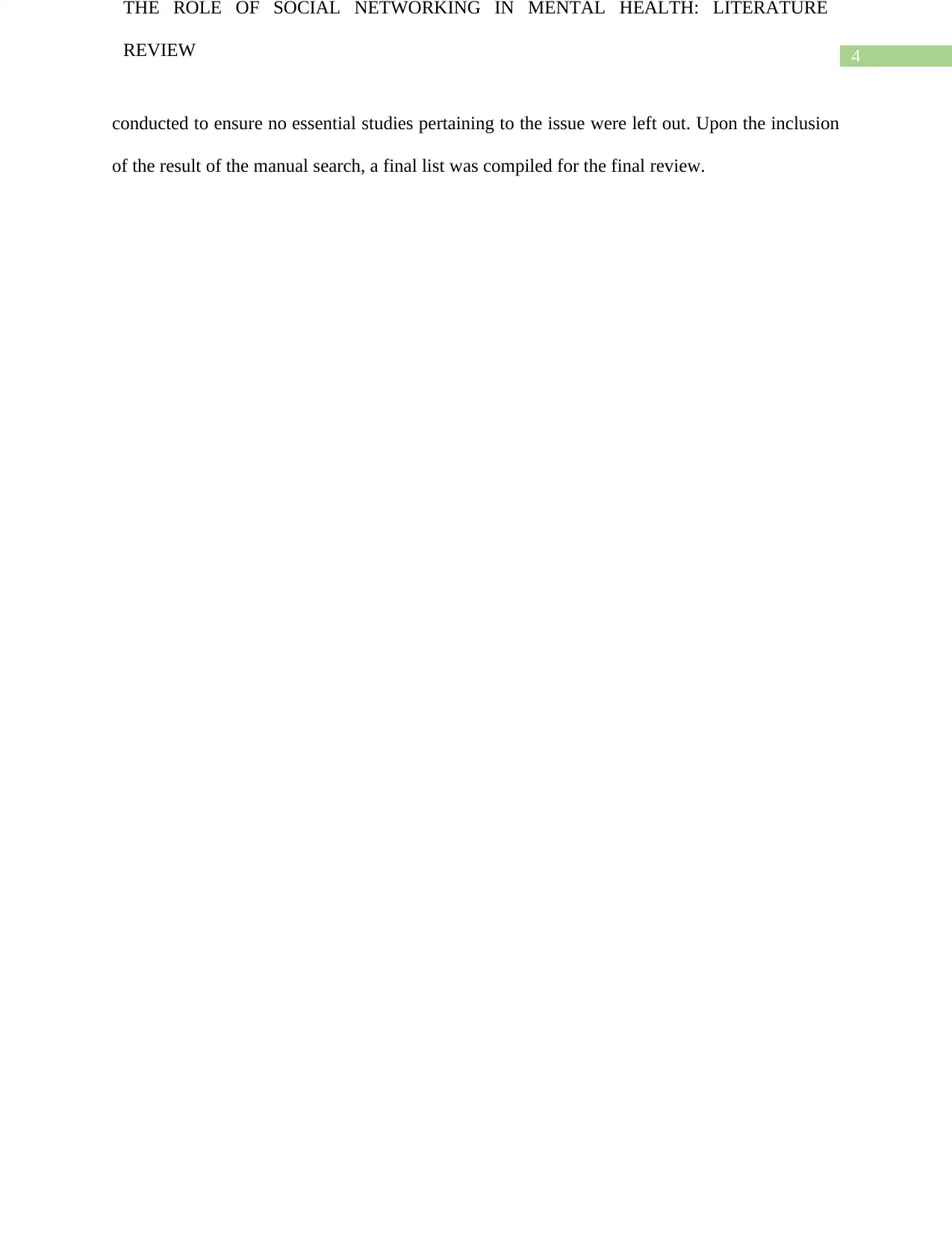
4
THE ROLE OF SOCIAL NETWORKING IN MENTAL HEALTH: LITERATURE
REVIEW
conducted to ensure no essential studies pertaining to the issue were left out. Upon the inclusion
of the result of the manual search, a final list was compiled for the final review.
THE ROLE OF SOCIAL NETWORKING IN MENTAL HEALTH: LITERATURE
REVIEW
conducted to ensure no essential studies pertaining to the issue were left out. Upon the inclusion
of the result of the manual search, a final list was compiled for the final review.
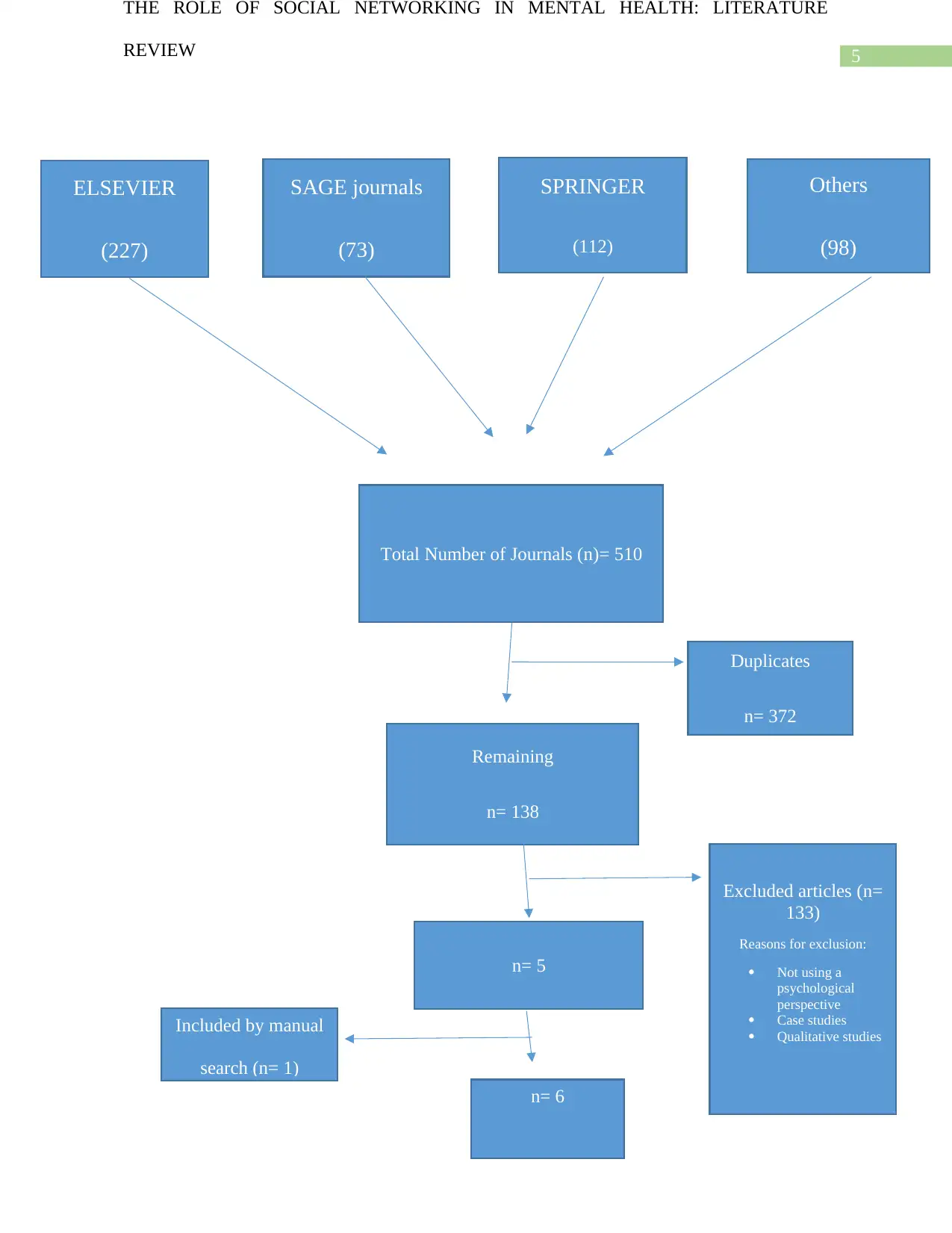
5
THE ROLE OF SOCIAL NETWORKING IN MENTAL HEALTH: LITERATURE
REVIEW
SAGE journals
(73)
ELSEVIER
(227)
SPRINGER
(112)
Others
(98)
Total Number of Journals (n)= 510
Remaining
n= 138
n= 5
n= 6
Duplicates
n= 372
Excluded articles (n=
133)
Reasons for exclusion:
Not using a
psychological
perspective
Case studies
Qualitative studies
Included by manual
search (n= 1)
THE ROLE OF SOCIAL NETWORKING IN MENTAL HEALTH: LITERATURE
REVIEW
SAGE journals
(73)
ELSEVIER
(227)
SPRINGER
(112)
Others
(98)
Total Number of Journals (n)= 510
Remaining
n= 138
n= 5
n= 6
Duplicates
n= 372
Excluded articles (n=
133)
Reasons for exclusion:
Not using a
psychological
perspective
Case studies
Qualitative studies
Included by manual
search (n= 1)
⊘ This is a preview!⊘
Do you want full access?
Subscribe today to unlock all pages.

Trusted by 1+ million students worldwide
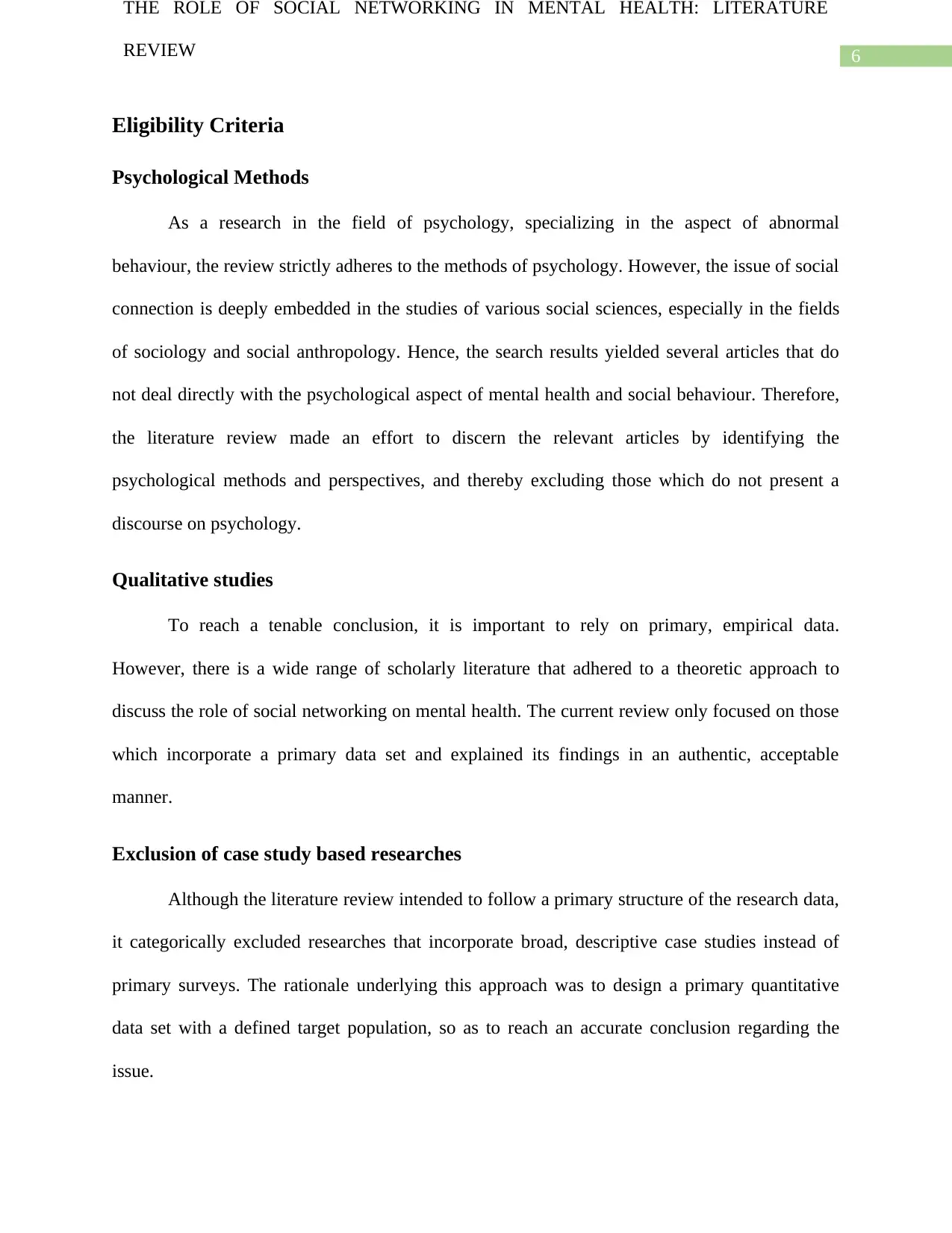
6
THE ROLE OF SOCIAL NETWORKING IN MENTAL HEALTH: LITERATURE
REVIEW
Eligibility Criteria
Psychological Methods
As a research in the field of psychology, specializing in the aspect of abnormal
behaviour, the review strictly adheres to the methods of psychology. However, the issue of social
connection is deeply embedded in the studies of various social sciences, especially in the fields
of sociology and social anthropology. Hence, the search results yielded several articles that do
not deal directly with the psychological aspect of mental health and social behaviour. Therefore,
the literature review made an effort to discern the relevant articles by identifying the
psychological methods and perspectives, and thereby excluding those which do not present a
discourse on psychology.
Qualitative studies
To reach a tenable conclusion, it is important to rely on primary, empirical data.
However, there is a wide range of scholarly literature that adhered to a theoretic approach to
discuss the role of social networking on mental health. The current review only focused on those
which incorporate a primary data set and explained its findings in an authentic, acceptable
manner.
Exclusion of case study based researches
Although the literature review intended to follow a primary structure of the research data,
it categorically excluded researches that incorporate broad, descriptive case studies instead of
primary surveys. The rationale underlying this approach was to design a primary quantitative
data set with a defined target population, so as to reach an accurate conclusion regarding the
issue.
THE ROLE OF SOCIAL NETWORKING IN MENTAL HEALTH: LITERATURE
REVIEW
Eligibility Criteria
Psychological Methods
As a research in the field of psychology, specializing in the aspect of abnormal
behaviour, the review strictly adheres to the methods of psychology. However, the issue of social
connection is deeply embedded in the studies of various social sciences, especially in the fields
of sociology and social anthropology. Hence, the search results yielded several articles that do
not deal directly with the psychological aspect of mental health and social behaviour. Therefore,
the literature review made an effort to discern the relevant articles by identifying the
psychological methods and perspectives, and thereby excluding those which do not present a
discourse on psychology.
Qualitative studies
To reach a tenable conclusion, it is important to rely on primary, empirical data.
However, there is a wide range of scholarly literature that adhered to a theoretic approach to
discuss the role of social networking on mental health. The current review only focused on those
which incorporate a primary data set and explained its findings in an authentic, acceptable
manner.
Exclusion of case study based researches
Although the literature review intended to follow a primary structure of the research data,
it categorically excluded researches that incorporate broad, descriptive case studies instead of
primary surveys. The rationale underlying this approach was to design a primary quantitative
data set with a defined target population, so as to reach an accurate conclusion regarding the
issue.
Paraphrase This Document
Need a fresh take? Get an instant paraphrase of this document with our AI Paraphraser
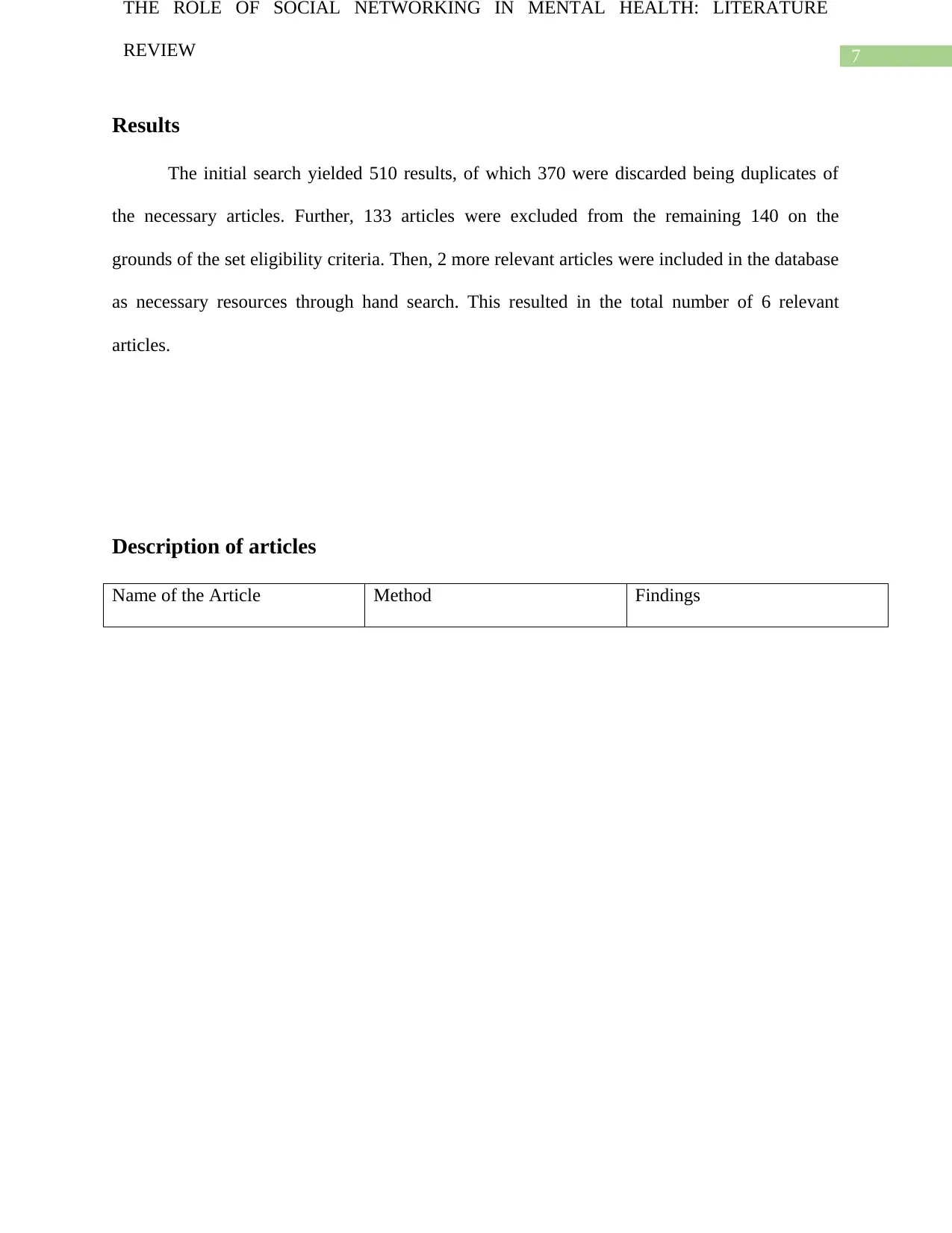
7
THE ROLE OF SOCIAL NETWORKING IN MENTAL HEALTH: LITERATURE
REVIEW
Results
The initial search yielded 510 results, of which 370 were discarded being duplicates of
the necessary articles. Further, 133 articles were excluded from the remaining 140 on the
grounds of the set eligibility criteria. Then, 2 more relevant articles were included in the database
as necessary resources through hand search. This resulted in the total number of 6 relevant
articles.
Description of articles
Name of the Article Method Findings
THE ROLE OF SOCIAL NETWORKING IN MENTAL HEALTH: LITERATURE
REVIEW
Results
The initial search yielded 510 results, of which 370 were discarded being duplicates of
the necessary articles. Further, 133 articles were excluded from the remaining 140 on the
grounds of the set eligibility criteria. Then, 2 more relevant articles were included in the database
as necessary resources through hand search. This resulted in the total number of 6 relevant
articles.
Description of articles
Name of the Article Method Findings
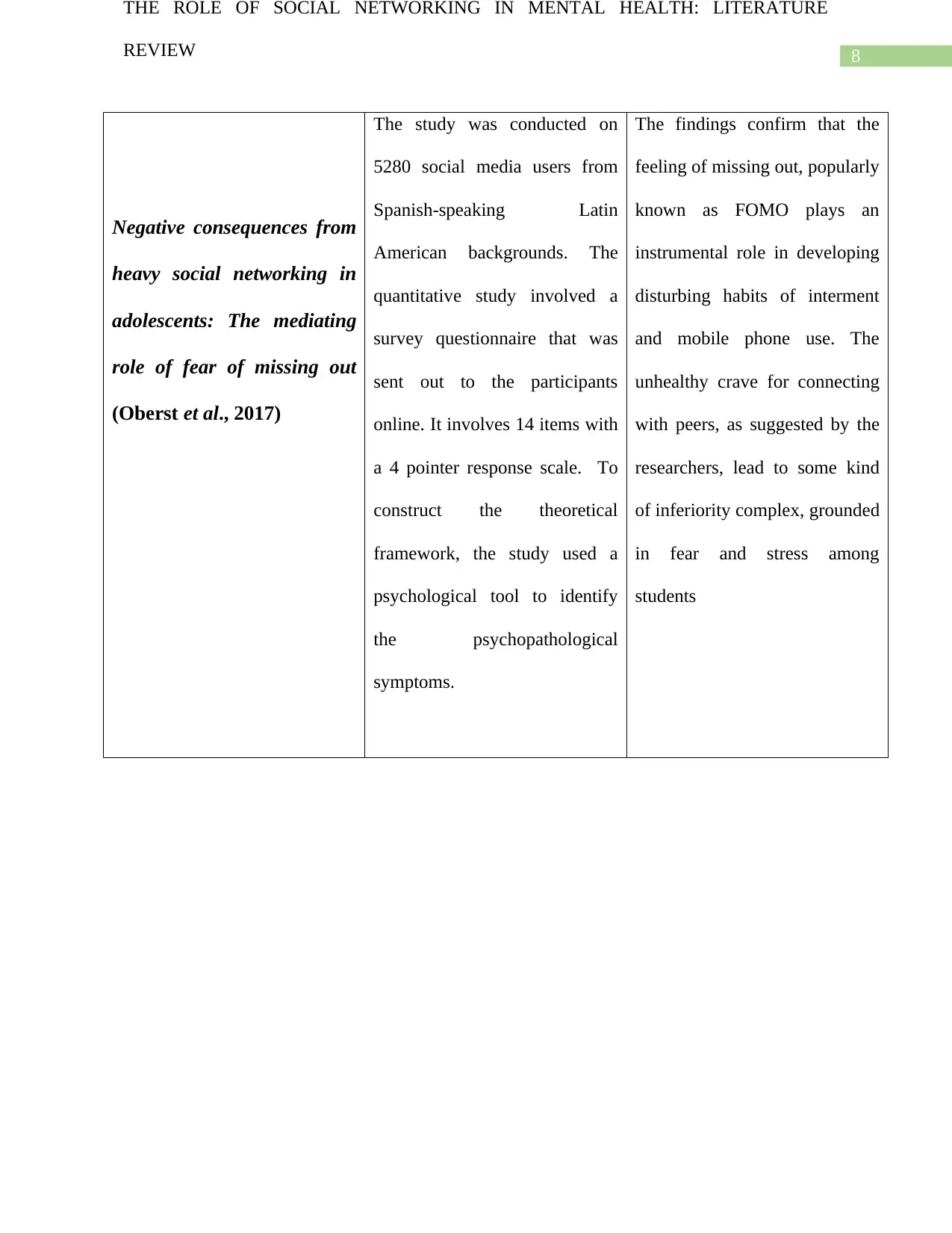
8
THE ROLE OF SOCIAL NETWORKING IN MENTAL HEALTH: LITERATURE
REVIEW
Negative consequences from
heavy social networking in
adolescents: The mediating
role of fear of missing out
(Oberst et al., 2017)
The study was conducted on
5280 social media users from
Spanish-speaking Latin
American backgrounds. The
quantitative study involved a
survey questionnaire that was
sent out to the participants
online. It involves 14 items with
a 4 pointer response scale. To
construct the theoretical
framework, the study used a
psychological tool to identify
the psychopathological
symptoms.
The findings confirm that the
feeling of missing out, popularly
known as FOMO plays an
instrumental role in developing
disturbing habits of interment
and mobile phone use. The
unhealthy crave for connecting
with peers, as suggested by the
researchers, lead to some kind
of inferiority complex, grounded
in fear and stress among
students
THE ROLE OF SOCIAL NETWORKING IN MENTAL HEALTH: LITERATURE
REVIEW
Negative consequences from
heavy social networking in
adolescents: The mediating
role of fear of missing out
(Oberst et al., 2017)
The study was conducted on
5280 social media users from
Spanish-speaking Latin
American backgrounds. The
quantitative study involved a
survey questionnaire that was
sent out to the participants
online. It involves 14 items with
a 4 pointer response scale. To
construct the theoretical
framework, the study used a
psychological tool to identify
the psychopathological
symptoms.
The findings confirm that the
feeling of missing out, popularly
known as FOMO plays an
instrumental role in developing
disturbing habits of interment
and mobile phone use. The
unhealthy crave for connecting
with peers, as suggested by the
researchers, lead to some kind
of inferiority complex, grounded
in fear and stress among
students
⊘ This is a preview!⊘
Do you want full access?
Subscribe today to unlock all pages.

Trusted by 1+ million students worldwide
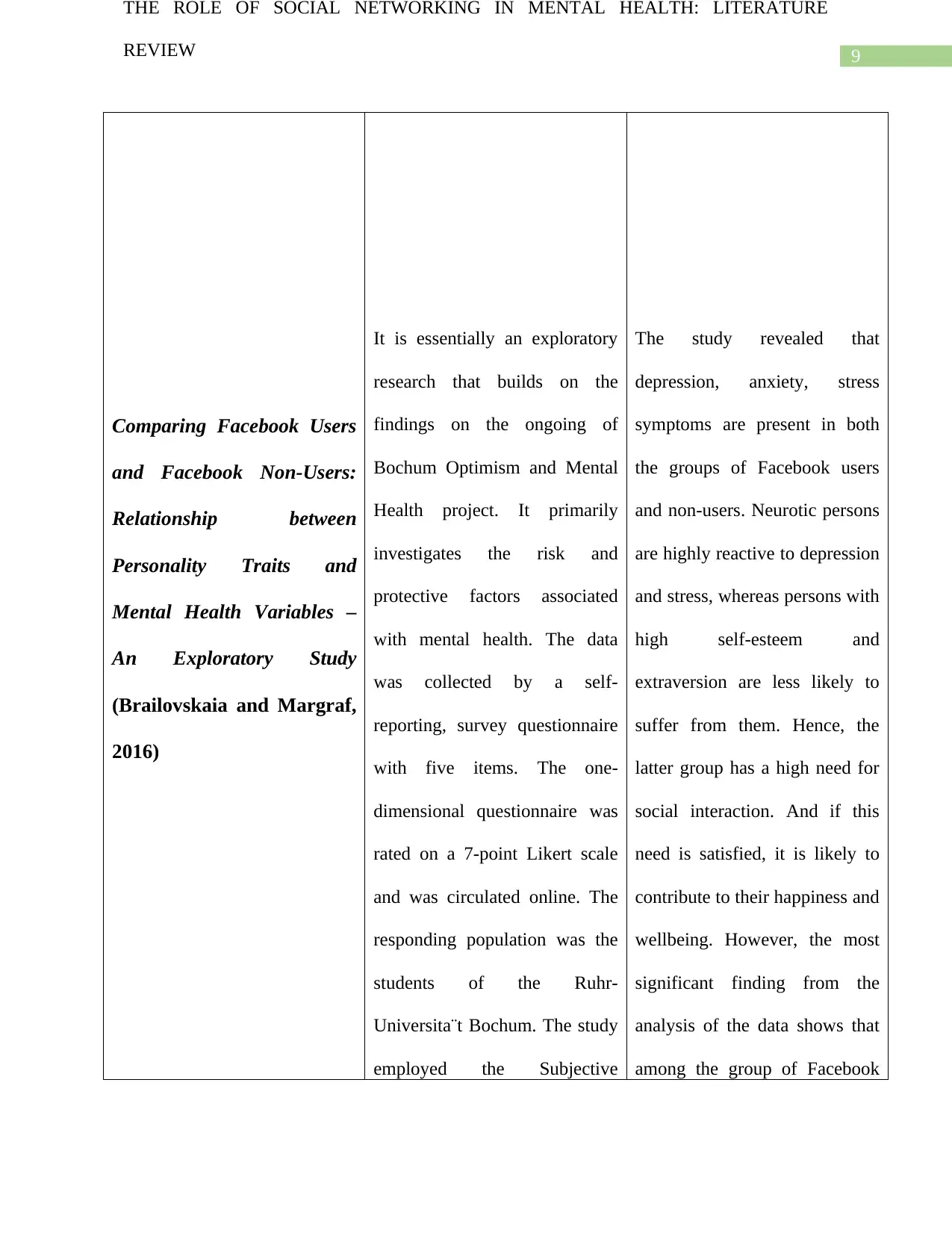
9
THE ROLE OF SOCIAL NETWORKING IN MENTAL HEALTH: LITERATURE
REVIEW
Comparing Facebook Users
and Facebook Non-Users:
Relationship between
Personality Traits and
Mental Health Variables –
An Exploratory Study
(Brailovskaia and Margraf,
2016)
It is essentially an exploratory
research that builds on the
findings on the ongoing of
Bochum Optimism and Mental
Health project. It primarily
investigates the risk and
protective factors associated
with mental health. The data
was collected by a self-
reporting, survey questionnaire
with five items. The one-
dimensional questionnaire was
rated on a 7-point Likert scale
and was circulated online. The
responding population was the
students of the Ruhr-
Universita¨t Bochum. The study
employed the Subjective
The study revealed that
depression, anxiety, stress
symptoms are present in both
the groups of Facebook users
and non-users. Neurotic persons
are highly reactive to depression
and stress, whereas persons with
high self-esteem and
extraversion are less likely to
suffer from them. Hence, the
latter group has a high need for
social interaction. And if this
need is satisfied, it is likely to
contribute to their happiness and
wellbeing. However, the most
significant finding from the
analysis of the data shows that
among the group of Facebook
THE ROLE OF SOCIAL NETWORKING IN MENTAL HEALTH: LITERATURE
REVIEW
Comparing Facebook Users
and Facebook Non-Users:
Relationship between
Personality Traits and
Mental Health Variables –
An Exploratory Study
(Brailovskaia and Margraf,
2016)
It is essentially an exploratory
research that builds on the
findings on the ongoing of
Bochum Optimism and Mental
Health project. It primarily
investigates the risk and
protective factors associated
with mental health. The data
was collected by a self-
reporting, survey questionnaire
with five items. The one-
dimensional questionnaire was
rated on a 7-point Likert scale
and was circulated online. The
responding population was the
students of the Ruhr-
Universita¨t Bochum. The study
employed the Subjective
The study revealed that
depression, anxiety, stress
symptoms are present in both
the groups of Facebook users
and non-users. Neurotic persons
are highly reactive to depression
and stress, whereas persons with
high self-esteem and
extraversion are less likely to
suffer from them. Hence, the
latter group has a high need for
social interaction. And if this
need is satisfied, it is likely to
contribute to their happiness and
wellbeing. However, the most
significant finding from the
analysis of the data shows that
among the group of Facebook
Paraphrase This Document
Need a fresh take? Get an instant paraphrase of this document with our AI Paraphraser
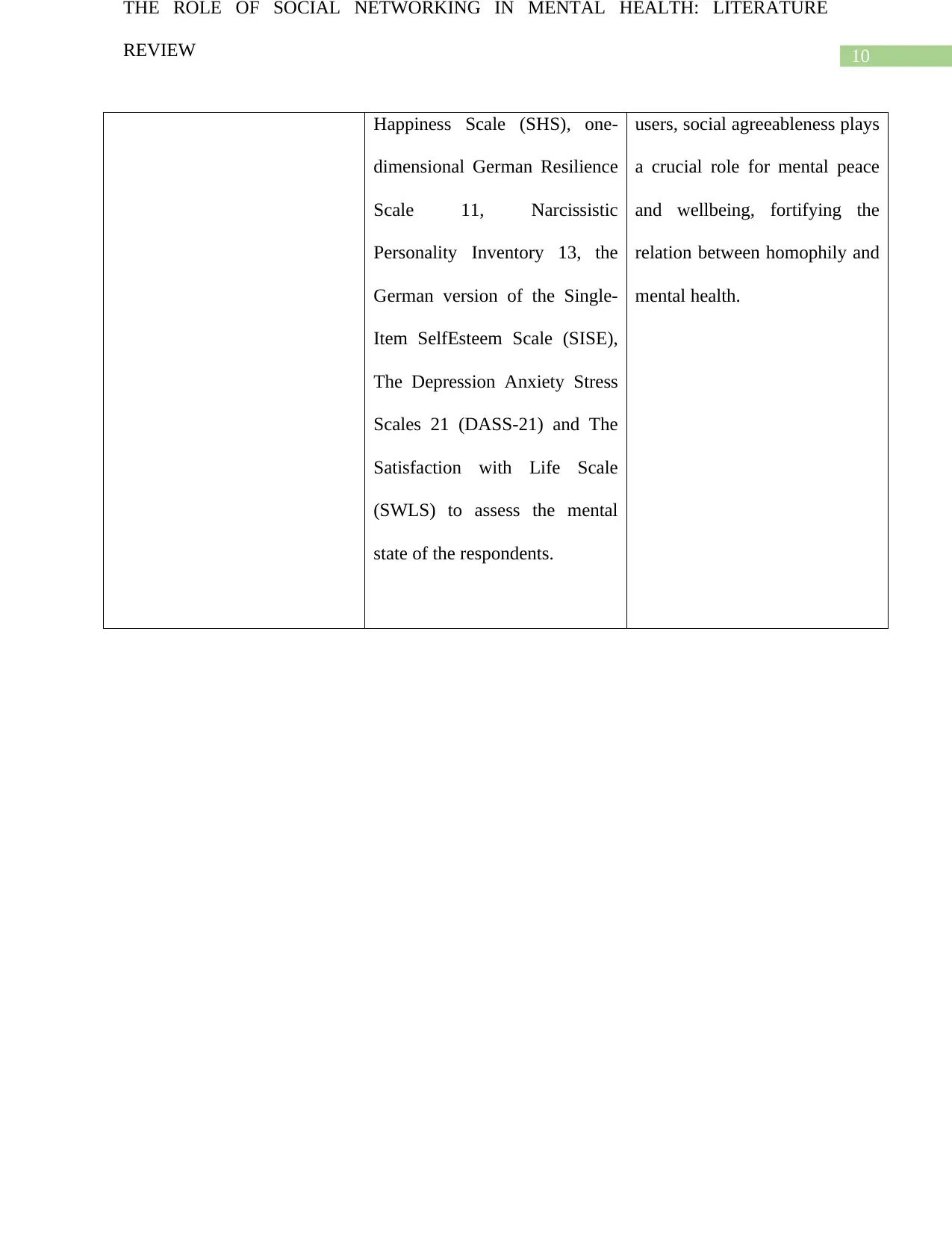
10
THE ROLE OF SOCIAL NETWORKING IN MENTAL HEALTH: LITERATURE
REVIEW
Happiness Scale (SHS), one-
dimensional German Resilience
Scale 11, Narcissistic
Personality Inventory 13, the
German version of the Single-
Item SelfEsteem Scale (SISE),
The Depression Anxiety Stress
Scales 21 (DASS-21) and The
Satisfaction with Life Scale
(SWLS) to assess the mental
state of the respondents.
users, social agreeableness plays
a crucial role for mental peace
and wellbeing, fortifying the
relation between homophily and
mental health.
THE ROLE OF SOCIAL NETWORKING IN MENTAL HEALTH: LITERATURE
REVIEW
Happiness Scale (SHS), one-
dimensional German Resilience
Scale 11, Narcissistic
Personality Inventory 13, the
German version of the Single-
Item SelfEsteem Scale (SISE),
The Depression Anxiety Stress
Scales 21 (DASS-21) and The
Satisfaction with Life Scale
(SWLS) to assess the mental
state of the respondents.
users, social agreeableness plays
a crucial role for mental peace
and wellbeing, fortifying the
relation between homophily and
mental health.
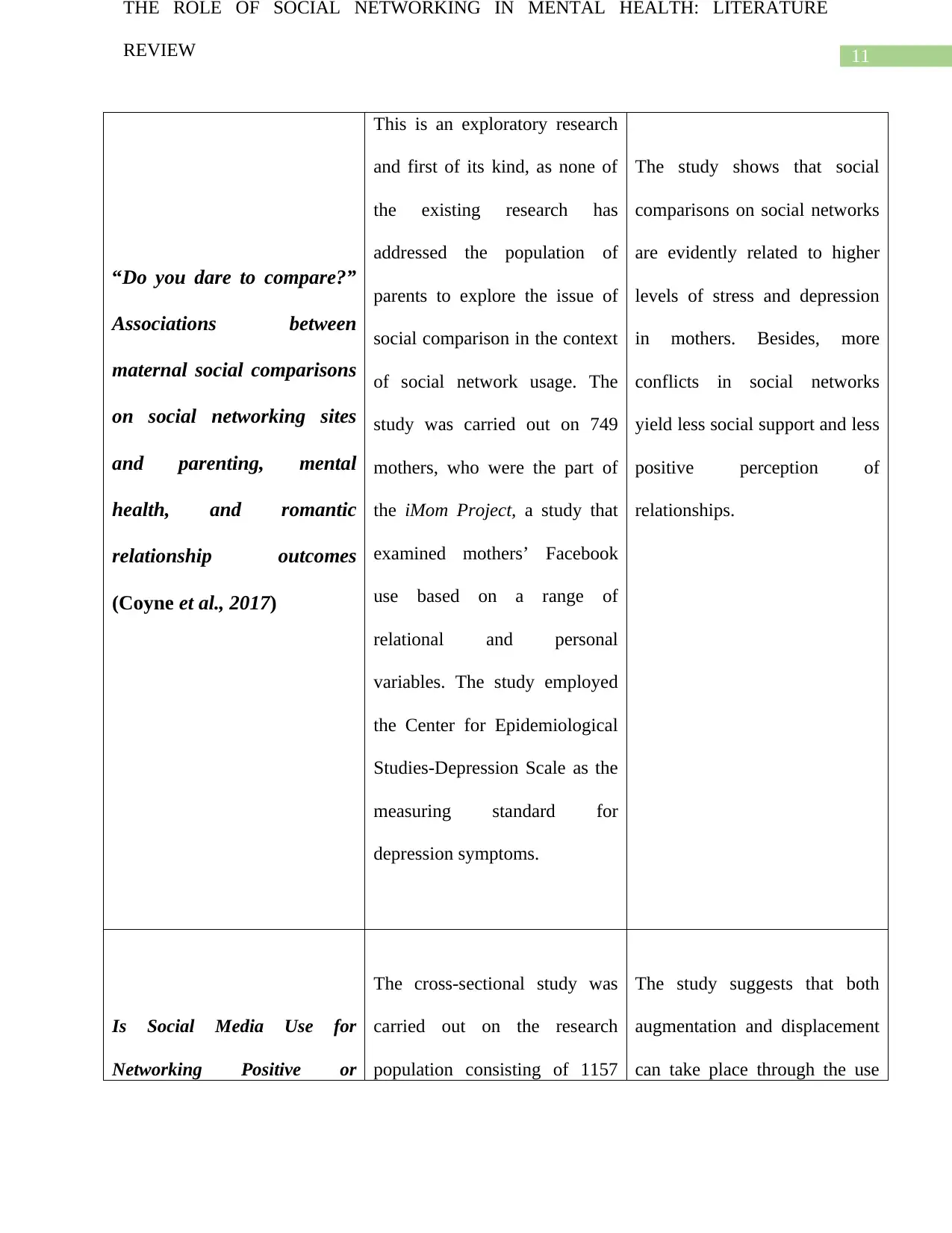
11
THE ROLE OF SOCIAL NETWORKING IN MENTAL HEALTH: LITERATURE
REVIEW
“Do you dare to compare?”
Associations between
maternal social comparisons
on social networking sites
and parenting, mental
health, and romantic
relationship outcomes
(Coyne et al., 2017)
This is an exploratory research
and first of its kind, as none of
the existing research has
addressed the population of
parents to explore the issue of
social comparison in the context
of social network usage. The
study was carried out on 749
mothers, who were the part of
the iMom Project, a study that
examined mothers’ Facebook
use based on a range of
relational and personal
variables. The study employed
the Center for Epidemiological
Studies-Depression Scale as the
measuring standard for
depression symptoms.
The study shows that social
comparisons on social networks
are evidently related to higher
levels of stress and depression
in mothers. Besides, more
conflicts in social networks
yield less social support and less
positive perception of
relationships.
Is Social Media Use for
Networking Positive or
The cross-sectional study was
carried out on the research
population consisting of 1157
The study suggests that both
augmentation and displacement
can take place through the use
THE ROLE OF SOCIAL NETWORKING IN MENTAL HEALTH: LITERATURE
REVIEW
“Do you dare to compare?”
Associations between
maternal social comparisons
on social networking sites
and parenting, mental
health, and romantic
relationship outcomes
(Coyne et al., 2017)
This is an exploratory research
and first of its kind, as none of
the existing research has
addressed the population of
parents to explore the issue of
social comparison in the context
of social network usage. The
study was carried out on 749
mothers, who were the part of
the iMom Project, a study that
examined mothers’ Facebook
use based on a range of
relational and personal
variables. The study employed
the Center for Epidemiological
Studies-Depression Scale as the
measuring standard for
depression symptoms.
The study shows that social
comparisons on social networks
are evidently related to higher
levels of stress and depression
in mothers. Besides, more
conflicts in social networks
yield less social support and less
positive perception of
relationships.
Is Social Media Use for
Networking Positive or
The cross-sectional study was
carried out on the research
population consisting of 1157
The study suggests that both
augmentation and displacement
can take place through the use
⊘ This is a preview!⊘
Do you want full access?
Subscribe today to unlock all pages.

Trusted by 1+ million students worldwide
1 out of 19
Related Documents
Your All-in-One AI-Powered Toolkit for Academic Success.
+13062052269
info@desklib.com
Available 24*7 on WhatsApp / Email
![[object Object]](/_next/static/media/star-bottom.7253800d.svg)
Unlock your academic potential
Copyright © 2020–2025 A2Z Services. All Rights Reserved. Developed and managed by ZUCOL.




